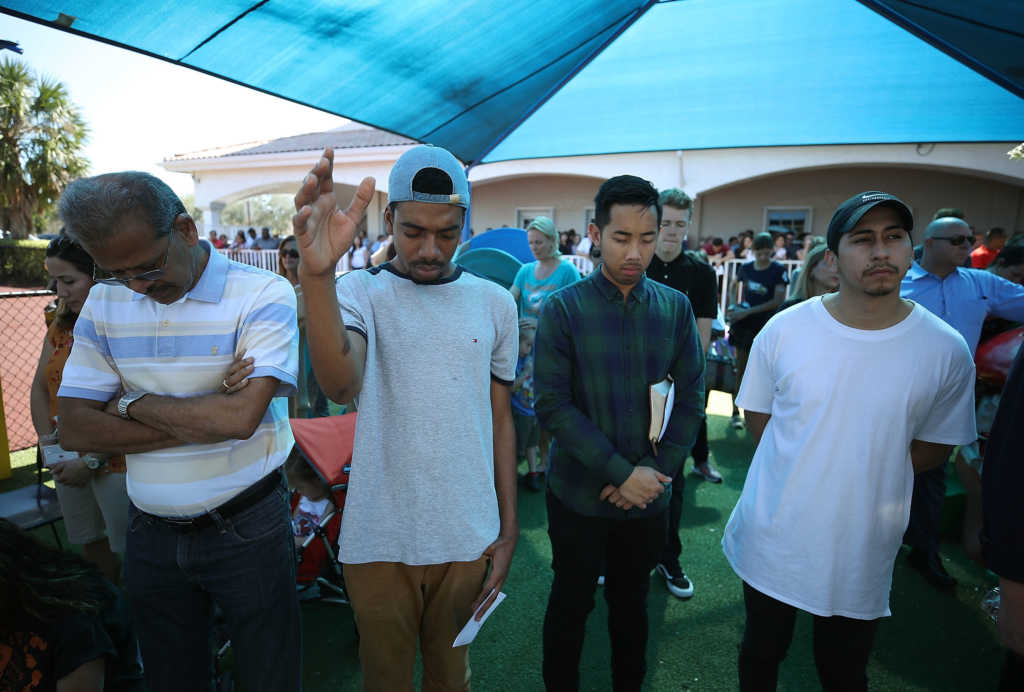‘Spare us your thoughts and prayers.’
This complaint is growing quite tiresome and predictable. It’s a sign of the times that it has become necessary to explain why and how prayer should be received as a welcome expression after something tragic such as the horrific Florida school shooting yesterday.
Everyone watching events unfold yesterday were of course immediately mortified and heartbroken at what they were witnessing. It’s hard for most of us to comprehend such depths of evil, and it can leave us feeling overwhelmed. Naturally, when we don’t fully understand something, we make an appeal to the One who understands all and is above all things – in other words, we pray to the almighty God.
This is a perfectly sensible and appropriate gut reaction to have, yet it is becoming standard fare for those who feel they know better to scold those who pray and mock their appeals to God. A sportswriter named Peter King led the righteous indignation fueled charge on Twitter yesterday, admonishing those who prayed for the victims and their families as people who are “not part of the America we need to strive for.”
Whoever says:
—“A gun didn’t do this; a sick person did.”
—“Thoughts and prayers to all the families.”
—“Now is not the time to discuss gun control.”
Get lost. Get off my feed. You are not part of the America we need to strive for.— Peter King (@peter_king) February 15, 2018
This tweet, of course, assumes several things:
First, that further gun control restrictions currently being discussed (i.e. banning AR-15 like weapons) will stop gun violence. King and others who make similar arguments place themselves in the position of having the obvious correct answer to the issue, and reduces all those who disagree (or don’t immediately call for gun control) as people who would rather kiss up to the NRA than keep children alive. This is grossly irresponsible when there is no certainty that banning certain individual weapons will stop such shootings from taking place.
King’s stance also assumes that government regulations are greater than God. When considering the believers point of view, however, it is obvious and should go without saying that they believe God is much higher than any government regulation ever could be. Whether someone believes this point or not, is irrelevant. What should be taken into account is the belief of the person praying – they believe they are taking this concern to a higher power, and therefore it should be appreciated. Clearly the main problem we have today is a problem that has existed long before any of us were around – and that is evil. No amount of laws could ever rid the planet from evil – no, only God can do that. So why wouldn’t we first chat with Him about it before running to government as the ultimate solution?
King assumes prayer does not count as action, and also assumes believers are not capable of taking additional actions besides praying. It is possible for Christians to say a prayer and then pick up the phone to call their Congressman. Why is this so difficult for people to understand? Christians pray, love and do. We are able to walk and chew gum at the same time.
Finally, King assumes the “America we need to strive for” is one where God and the folks who pray to Him aren’t around. This is a bizarre claim, since America’s founding ideals essentially came from the Bible, and while not all founders were Christians — and they did not create a theocracy — yes, prayers are actually quite embedded in the American ideal. In fact, the Continental Congress specifically set aside days for prayer and fasting. Obviously, they felt it quite important and necessary to help them ‘get things done.’
This complaint is opening the door for even stranger complaints. This one comes from a rabbi, no less:
God doesn’t want your thoughts and prayers.
God wants you to know that you are responsible to care for and protect other people. And to take action to do so. https://t.co/T8IL8uKBwm
— Rabbi Danya Ruttenberg (@TheRaDR) February 15, 2018
Actually, the rabbi could not be more wrong. God absolutely wants us to pray. How do we know? Because He commands us to:
Matthew 5:44 tells us to pray for those who persecute us. Matthew 6:5 says “when” you pray, not if. In Romans 12:12 we’re again commanded to be “faithful in prayer” while Ephesians 6:18 says we should pray “on all occasions with all kinds of prayers and requests.” In 1 Thessalonians 5:17 we’re instructed to “pray continually” and 1 Timothy 2:1 says that “requests, prayers, intercession and thanksgiving be made for everyone” while Colossians 4:2 says to “devote yourselves to prayer.”
Seems quite obvious that God wants us to pray and pray often. All the time, in fact. We are simply being obedient when we pray for others. To not pray for someone in the wake of a tragedy would actually be an incredible insult. How much would we have to despise someone to drop everything we believe about prayer and it’s part in bringing healing, redemption, peace, endurance, joy, etc – just because some people on Twitter are tired of hearing about it?
All throughout the Bible in almost every situation, people appeal to God for protection, empowerment, healing, for greater faith, for strength, endurance, hope, discernment, unity, help, wisdom, help, miracles, for God’s name to be exalted – and much more. God commands us to do it, and in some cases, God changes people’s will in answer to prayer.
Who knows, maybe the prayers of the saints will be heard and the next madman will have a change of heart. It’s easy to do, and requires nothing to start. So why not? Why wouldn’t we pray even more?
I, for one, certainly will.



